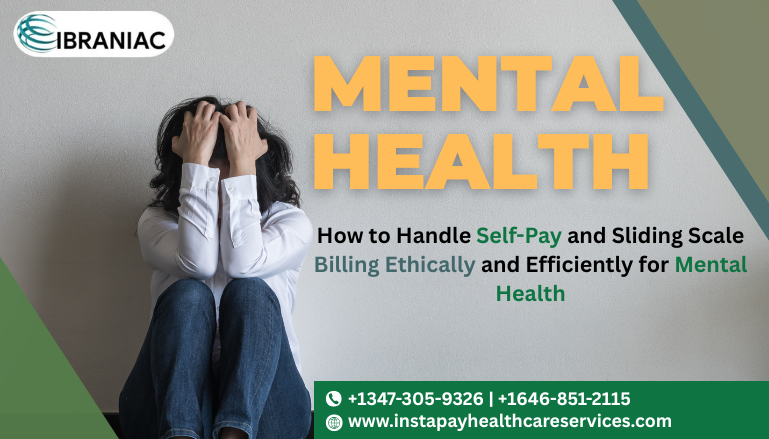
How to Handle Self-Pay and Sliding Scale Billing Ethically and Efficiently for Mental Health
Mental health providers in the USA face a delicate challenge balancing accessibility for patients with the financial sustainability of their practice. With rising demand for mental health services and gaps in insurance coverage, more patients opt to pay out-of-pocket. At the same time, ethical responsibilities often lead providers to offer sliding scale fees to those in need. Handling self pay in mental health and sliding scale billing properly is crucial to ensure compliance, sustainability, and fairness.
At Instapay Healthcare Services, we help practices implement ethical billing for mental healthcare services, so providers can focus on care not paperwork or financial worries.
The Growing Role of Self Pay in Mental Health
Many patients in the USA prefer self-pay arrangements for mental health services. Some choose this route to protect privacy, avoid limited insurance networks, or because their plans exclude certain services. For providers, self-pay patients offer immediate payment without waiting on insurance claims, but they also bring unique challenges.
- Setting fair rates without discouraging care seeking.
- Clearly communicating fees and payment policies.
- Staying compliant with federal and state laws around discounts and fee waivers.
When handled correctly, mental health billing in the USA can accommodate self-pay patients while maintaining the financial health of the practice.
What Is Sliding Scale Billing and Why Use It?
Sliding scale billing allows providers to adjust fees based on a patient’s income and ability to pay. This promotes accessibility for underserved or low-income populations while still recouping some costs for services rendered.
However, sliding scales must be structured carefully. Arbitrary discounts can violate payer agreements and ethical guidelines. That’s why practices should develop a clear, documented policy.
- Define eligibility criteria (e.g., based on federal poverty guidelines).
- Specify documentation patients must provide to qualify.
- Establish tiered discounts that are predictable and equitable.
- Review and update the policy annually to reflect economic changes.
Best Practices for Ethical and Efficient Billing
Here are some key steps to handle self-pay in mental health and sliding scales responsibly:
1. Transparency is Essential.
Communicate your self-pay rates and sliding scale policies upfront, ideally during intake. Provide written agreements to prevent misunderstandings.
2. Standardize Your Policy.
Use a written, consistent sliding scale policy to avoid accusations of favoritism or discrimination. Keep it aligned with industry norms and legal requirements.
3. Document Everything.
Maintain thorough records of eligibility assessments, signed agreements, and proof of income. This protects your practice during audits.
4. Train Your Team.
Ensure your administrative staff understands the policies and can explain them clearly to patients while maintaining empathy and professionalism.
5. Leverage Professional Billing Support.
Partnering with experienced billing experts, like Instapay Healthcare Services, can help your practice manage these arrangements smoothly. We ensure your mental health billing remains ethical, efficient, and compliant, no matter how complex the payment structure.
Conclusion
Balancing accessibility with financial viability in mental health care is not easy but it’s necessary. Offering fair self-pay options and structured sliding scales enables more patients to access the help they need, without jeopardizing the sustainability of your practice.
At Instapay Healthcare Services, we specialize in ethical billing for mental healthcare services, helping providers across the USA navigate self-pay and sliding scale billing confidently. Let us help you support your patients and your bottom.
Contact us today to learn more about our mental health billing solutions.




